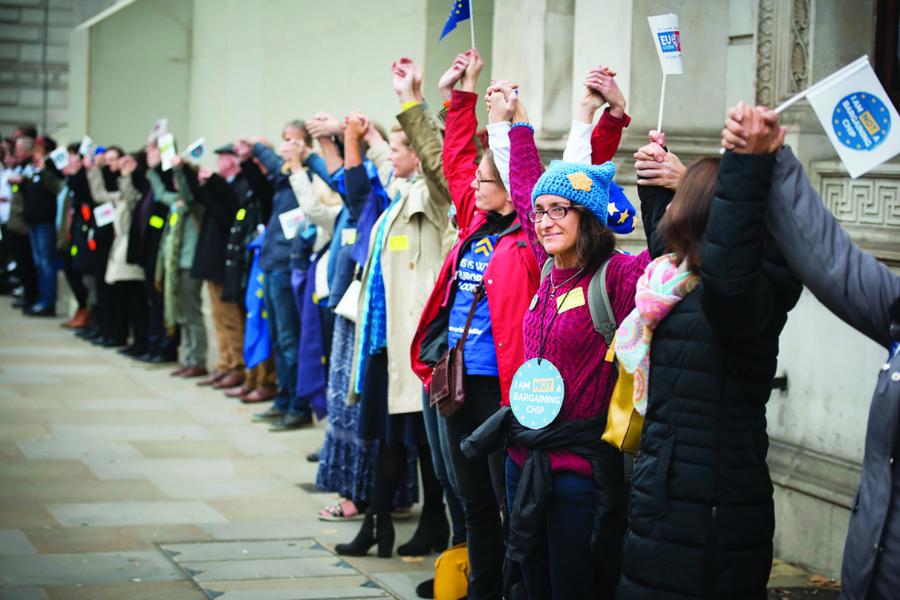Our safeguarding policy
the3million believes that it is incredibly important to have a policy, and that children, young people and adults at risk have the right to be protected from all types of harm or abuse. Therefore, we have produced this policy and procedure so we have a clear set of guidelines on how to manage safeguarding at the3million
the3million’s Safeguarding Policy establishes a framework to support employee, volunteer and management representatives in their practices and clarifies the organisation’s expectations. It outlines how the organisation undertakes its responsibilities with regard to protection of children and/or vulnerable adults and how it will appropriately respond to concerns.
The policy describes:
- The potential risks - who may pose a risk and the situations that may increase risk.
- Checking people who work or volunteer for the organisation.
- How people can raise concerns.
- How the3million responds to concerns or allegations of harm.
- Raising awareness for staff and volunteers.
Definitions
A child is someone under the age of 18.
A vulnerable adult is someone over the age of 18 who may be unable to take care of or protect themselves from harm or from being exploited. This includes someone who:
- Is elderly and frail
- Has a mental illness including dementia
- Has a physical or sensory disability
- Has a learning disability
- Has a severe physical illness
Safeguarding - embedding practices throughout the organisation to ensure the protection of children and/or vulnerable adults wherever possible.
Protection - responding to circumstances that arise.
Designated Safeguarding Officer
The CEO is responsible for ensuring this policy is implemented.
The CEO is also appointed as a Designated Safeguarding Officer (DSO) to oversee the implementation of this policy and with whom any staff members can raise any concerns.
The CEO will nominate a deputy safeguarding officer. In the absence of a deputy, the chair of the board is the deputy safeguarding officer.
To contact the CEO about the policy or to make a claim, please use our contact form, stating clearly the purpose of your message.
SAFEGUARDING PROCEDURE
Personnel checks/recruitment
All staff at the3million, paid or voluntary, who either work with children and/or vulnerable adults through the3million’s activities, or volunteer who are under or vulnerable adult, need to be safe to do so in child/vulnerable adult’s protection terms. To ensure this, the3million will ensure the following:
- checks are carried out on all prospective senior management, staff and volunteers who will be/are working with children and/or vulnerable adults:
- criminal records check at enhanced level;
- Personal referee, nominated by the applicant - a person not related to the applicant and can attest to the applicant's character, trustworthiness and any previous experience of working with/looking after children and young people.
- Proof of identity, preferably passport or other appropriate photographic identity, and of residence
- At all times the onus is on the applicant/employee/volunteer to reveal any conviction, caution, bind-over, probation order, or pending prosecution, whether imposed prior to or within the period the applicant works on project activities.
- Job descriptions for all roles involving contact with children and/or vulnerable adults will contain reference to safeguarding responsibilities. Recruitment adverts or application details will include the following safeguarding statement: “recruitment is undertaken in line with safe recruitment practices.‟
Application forms will require applicants to sign consent for checks to be made and the DSO will be responsible for conducting the enquiries ensuring the confidential and security of records and will maintain a confidential file on each applicant including the following:
- copies of all forms, consents and replies;
- A log of all other non-written communication that is relevant will be recorded
- The file of an unsuccessful applicant, or a successful applicant who declines the post, will be kept for six months and then safely destroyed by the DSO. This period will be increased to 12 months from the date of leaving the project's service for any successful applicant who commences work with the project.
Existing staff (paid or unpaid) who transfer from a role which does not require a DBS check to one which involves contact with children/vulnerable adults will be subject to a DBS check.
Consultants, sub-contractors and partner organisations commissioned to work for the3million and working with children/vulnerable adults will also be required to show they meet the3million’s safeguarding requirements.
In line with data protection law, everyone has the right to inspect their own confidential records and may do so on request to the DSO. The DSO may only withhold such agreement and access if to do so might jeopardise a project or police or social services investigation relating to child protection matters or might lead to a child's welfare and safety being compromised.
Induction and Training
the3million shall ensure that there is adequate and appropriate induction and ongoing training and information to all, as required employed staff and voluntary workers concerning child protection matters, which shall be the responsibility of the Chief Executive to devise and implement. All employees and voluntary workers shall have this policy drawn to their attention on joining the project and it shall be the duty of the Chief Executive, to ensure that such persons are fully aware of how and where to access the full policy statement, and that the DSO is the person through whom they should route queries concerning the policy.
Reporting of Concerns
It is the duty of all employees to prevent abuse, including the duty to report any abuse discovered or suspected.
Here are details of types of abuse to be aware of:
- Physical: this may involve hitting, slapping, pushing, kicking, shaking, throwing, poisoning, burning or scalding, drowning, suffocating, misuse of medication, inflicting inappropriate physical sanctions, or otherwise causing physical harm, including fabricating the symptoms of, or deliberately causing the individual ill health (DfE 2014, DoH 2000)
- Emotional/Psychological: this is the persistent emotional ill-treatment of a child, young person or vulnerable adult such as to cause severe and persistent adverse effects on their emotional development. Threats of harm or abandonment; humiliation; blaming; intimidation; coercion; harassment; verbal abuse, bullying (including cyberbullying) and being prevented from receiving services or support are all forms of emotional abuse (DoH 2000).
- Sexual: such as rape, sexual assault or sexual acts occurring through force or enticement and which a child, young person or vulnerable adult could not have consented to, or to which they were pressurised into consenting.
When listening to someone disclosing a safeguarding issue, there are three rules:
- Do listen non-judgmentally & sympathetically.
- Don`t promise confidentiality.
- Do report to the CEO who is the designated safeguarding officer.
Safeguarding issues are logged, you will be kept informed of the situation within the limits of confidentiality.
Action that should be taken if you have concerns, suspicions, witness abuse or someone discloses abuse:
STEP 1
- Take whatever action is required to ensure the immediate safety or medical welfare of the individual
- Remain calm and non-judgmental
- Do not discourage from disclosure
- Use active listening skills and remain sympathetic and attentive
- Give reassurance but do not press for more detail or make promises
STEP 2
- Explain that you cannot keep information about alleged or suspected abuse confidential
- Clarify main facts, summarise what has been said to you
- Remain sensitive
- Explain that the designated safeguarding officer must be informed
- Seek the person’s consent to share this information
- Consider issues of capacity, consent, best interest and public protection
- Offer future support from yourself or others (designated safeguarding officer)
STEP 3
- Take all reasonable steps to ensure that the individual is in no immediate danger of further harm
- Preserve evidence
Any suspicion, incident, allegation or other manifestation relating to child/vulnerable adult protection should be reported to a manager and/or the DSO. The reporting member of staff will make a verbal report but should also make a written report outlining in adequate detail what was heard, seen, reported, alleged etc. The member of staff will sign and date the written report. If more than one worker observes the same incident, a separate report is to be made by each worker. The DSO will keep records in such a way to enable appropriate cross-referencing of reports.
The DSO, who is the CEO, will decide whether the matter can be dealt with internally or whether it is of such seriousness (e.g. a criminal offence has occurred) that the appropriate authorities need to be informed.
Reporting and dealing with allegations against members of staff
Any member of staff (paid or unpaid) is required to report any concerns about a colleague to the DSO. The DSO should inform the person against whom an allegation has been made as soon as possible unless there appears to be a case that this might prejudice a criminal investigation. The DSO will also consider whether suspension of the worker is advisable whilst the allegation is being investigated. The DSO will gather as much detail from available sources as possible, by way of investigation. The DSO will notify the Chair of trustees.
They will recommend whether the circumstances constitute grounds either:
- to treat the matter as a disciplinary issue, either as misconduct or gross misconduct, with associated rights of appeal; or
- to dismiss the allegations as unfounded, or to make such other non-disciplinary recommendations as are appropriate.
The person against whom such non-criminal allegations are made should have an opportunity to give an explanation or answer to any allegation at an interview conducted by and minuted by the DSO, as they are also a CEO.
If a criminal allegation is made e.g. of sexual abuse and impropriety, or physical assault, or inappropriate behaviour, the CEO’s will suspend the person from any activity in the project under the heading of alleged Gross Misconduct. If it is warranted, this may be without pay, should the evidence appear strong enough to justify the matter. The matter will be reported immediately to the police.
Disciplinary action
Employees who don’t conform to the3million’s child and vulnerable adult protection policy could face disciplinary action up to and including dismissal.
Review of this policy
Management shall review this policy, its effectiveness and regarding its implementation every two years and the DSO shall ensure that the views of all workers, paid and voluntary, are sought and reflected in such a review process, and that any statutory authority input is sought as appropriate.
Adopted 26 March 2020. Review Date: 26 March 2022

